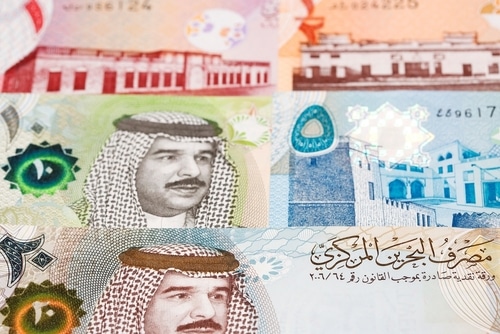The Bahraini Dinar (BHD) is one of the most highly valued currencies in the world. Recognized for its strength and stability, it is a vital part of Bahrain’s thriving financial landscape. Whether you’re a traveler, an investor, or someone sending money to loved ones in Bahrain, understanding the basics of the Bahraini Dinar is essential.
This guide takes you through the history of the Bahraini Dinar, its features, and why it maintains such a strong presence globally. You’ll also find practical tips for converting, using, and transferring BHD safely and easily.
What Is the Bahraini Dinar?
The Bahraini Dinar (BHD) is the official currency of Bahrain. Its name, “Dinar,” originates from the Roman word “denarius,” a term used for coins. Introduced in 1965, the Bahraini Dinar replaced the Gulf Rupee and became the standard currency for Bahrain’s growing economy. Today, the BHD is divided into 1,000 fils, making smaller transactions simple and efficient.
Here are the current denominations:
- Coins in fils (smaller units): 5, 10, 25, 50, 100, 500 fils
- Banknotes in dinars (main units): ½, 1, 5, 10, and 20 dinars
While its value fluctuates slightly in international markets, the Bahraini Dinar is known for being consistently pegged to the US Dollar. This fixed exchange rate is one of the key contributors to its stability.
Why Is the Bahraini Dinar Among the Strongest Currencies?
The Bahraini Dinar consistently ranks as one of the strongest and most valuable currencies in the global market. But what makes it so robust? Here are some of the reasons:
1. Pegged to the US Dollar
The Bahraini government maintains a fixed exchange rate, with 1 BHD closely tied to approximately 2.65 USD. This pegging provides a foundation of stability that prevents erratic exchange rate fluctuations.
2. Oil-Driven Economy
Bahrain’s economy is largely supported by its oil and natural gas exports. The country has long been a major player in the global energy sector, and its wealth from this industry shores up the value of its currency.
3. Diversified Investments
Beyond oil, Bahrain has invested heavily in banking, finance, and tourism. With Manama (the capital) recognized as a financial hub in the Middle East, the country benefits from international trade and investments that further strengthen the BHD.
4. Limited Supply
One of the fundamental principles of currency strength is scarcity. Unlike some countries that print excessive amounts of money, Bahrain ensures that its currency supply is carefully regulated.
How the Bahraini Dinar Is Used in Everyday Life
The Bahraini Dinar plays a significant role both in local life and international transactions. Whether you’re shopping in Bahrain’s vibrant souks or sending money to friends and family back home, here are some facts about the BHD’s usage:
- Local Transactions: From daily groceries to luxury purchases, the Dinar’s divisions into 1,000 fils make it convenient for transactions of all sizes. You’ll rarely encounter difficulties in finding proper denominations.
- Cross-Border Transfers: Due to Bahrain’s expatriate population, the Dinar is often sent internationally. Tools like digital money transfer services make this process fast, secure, and cost-efficient.
- Travel: The Dinar is essential for travelers exploring Bahrain. It’s recommended to exchange some of your home currency into Bahraini Dinars before arriving to make payments smoother, especially for smaller vendors who may not accept cards.
Tips for Converting and Transferring Bahraini Dinars
If you’re handling Bahraini Dinars, whether for personal or professional reasons, keeping these tips in mind will help ensure smooth transactions:
1. Stay Updated on Exchange Rates
While the Dinar is pegged to the USD, small differences can affect conversions. Use reliable money transfer services or currency converter tools to get real-time updates on exchange rates.
2. Choose Transparent Money Transfer Services
When sending remittances to Bahrain, choose a service that offers low fees, clear exchange rates, and secure delivery options. Platforms like Remitly prioritize affordability and transparency, ensuring no hidden surprises.
3. Avoid Airport Exchanges
Currency exchange booths at airports often charge high fees and offer lower rates. Instead, use banks, authorized money exchange services, or online platforms for better value.
4. Secure Your Transactions
When sending large amounts of BHD digitally, verify the service provider’s security credentials to avoid fraud. Opt for services that offer tracking options and delivery guarantees.
Why the Bahraini Dinar Matters in Global Finance
The Bahraini Dinar is more than just a regional currency; it’s a symbol of financial strength, representing Bahrain’s role in international finance. Due to its stability and high value, the BHD is often favored in Middle Eastern trade deals, investments, and cross-border transactions.
For expatriates sending money back to Bahrain, its reliability ensures that transfers are received in full value without depreciation concerns. Similarly, investors view the Dinar as a reliable currency amid economic volatility in other parts of the world.
Final Thoughts: Managing Bahraini Dinar with Ease
Whether you’re handling Bahraini Dinars as a local, an expatriate, or a business professional, understanding its value and best practices can make a significant difference. Its strength, stability, and convenience make it an exceptional currency for everyday use and international transactions.
If you’re ready to send or manage Bahraini Dinars with confidence, platforms like Remitly offer secure and affordable solutions to get your money where it needs to go. Always stay informed, use reliable services, and enjoy the confidence that comes with handling one of the world’s strongest currencies.
